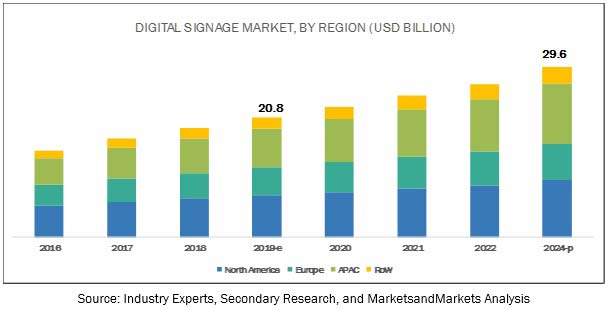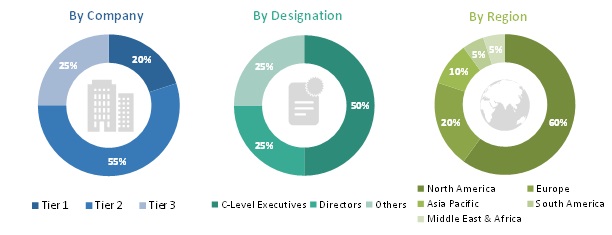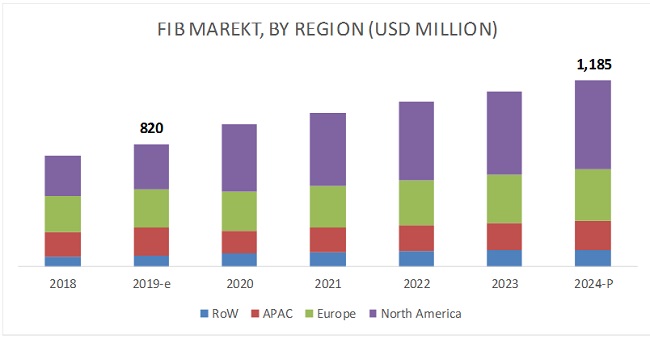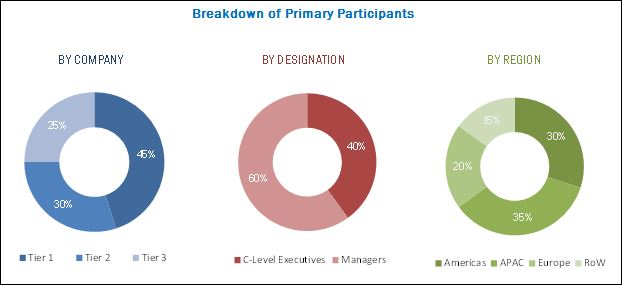The report "Augmented Reality Market by Offering (Hardware (Sensor, Displays & Projectors, Cameras), Software), Device Type (Head-mounted, Head-up), Application (Enterprise, Consumer, Commercial, Healthcare, Automotive), and Region - Global Forecast to 2024", is estimated to grow from USD 10.7 billion in 2019 and projected to reach USD 72.7 billion by 2024; it is expected to grow at a CAGR of 46.6% from 2019 to 2024. The healthcare sector has witnessed rapid technological advancements over the years, and various kinds of advanced imaging equipment have been introduced in the healthcare sector. The healthcare sector has one of the most important and practical applications of AR in the current market scenario.
• Download Informational PDF Brochure :-
https://www.marketsandmarkets.com/pdfdownloadNew.asp?id=82758548
https://www.marketsandmarkets.com/pdfdownloadNew.asp?id=82758548
Browse 102 market data Tables and 46 Figures spread through 191 Pages and in-depth TOC on "Augmented Reality Market - Global Forecast to 2024"
“Surge in need for AR devices in healthcare sector"
AR plays an important role in the healthcare sector. AR can be used to provide a virtual view of a patient, in which a surgeon can see the condition of the patient’s body parts. This can help the surgeon to conduct minimally invasive surgeries. The use of AR modeling and 3D visualization is expected to be of great help to the healthcare sector. The use of AR for improving fitness, teaching complex subjects to medical students, training doctors, managing pharmacy, and caring and supporting patients after they leave the hospital is driving the growth of the AR market in this sector.
“Head-up Displays is to grow at highest CAGR in augmented reality market during forecast period”
Augmented reality head-up displays are currently in an introductory phase and are all set to revolutionize the automotive sector. Many companies such as Continental, WayRay, and Visteon have already entered the market with their own plans for AR HUDs.
There have been indications of BMW introducing AR HUDs in their upcoming premium models, to be launched in 2020. Some of the current versions of BMW (7 series) have traditional HUDs. BMW has introduced an augmented reality app that provides a virtual experience of its cars. Here, such apps available for the virtual viewing of automobiles have been considered in the software market segment covered in the report and hence do not contribute to the standing of the HUD segment. BMW had also stated in a blog in March 2016 that they are still some time away from producing commercially-available AR HUDs for their automobiles.
“APAC to hold major share of the augmented reality market during the forecast period.”
E-commerce is becoming a major area of focus for retailers in APAC, where China is becoming the largest e-commerce market worldwide. The high demand for AR devices and software from the commercial sector would help drive the AR market in APAC. Growing consumer and commercial markets with increasing investments in countries such as Japan, India, and China would boost the growth of the AR market in APAC.
Major players in the augmented reality market are Google, Inc. (US), PTC, Inc. (US), Microsoft Corporation (US), Seiko Epson (Japan), Lenovo (China), Wikitude GmbH (Austria), Vuzix (US), Daqri Llc (US), Magic Leap, Inc. (US), Zugara, Inc. (US), Blippar (UK), Upskill (US), and Maxst (South Korea). Other players operating in the augmented reality market include Atheer, Inc. (US), Pristine, Inc. (US), Marxent Labs, Llc. (US), Inglobe Technologies (Italy), Meta Company (US), Augment (France), Niantic (US), Sixense Entertainment (US), Intel Corporation (US), Apple Inc. (US), Infinity Augmented Reality, Inc. (Israel), Facebook Corporation (US), Samsung Electronics Co. Ltd. (South Korea), Realwear (US), Dynabook Americas, Inc. (US), and Optinvent (France).
About MarketsandMarkets™
MarketsandMarkets™ provides quantified B2B research on 30,000 high growth niche opportunities/threats which will impact 70% to 80% of worldwide companies’ revenues. Currently servicing 7500 customers worldwide including 80% of global Fortune 1000 companies as clients. Almost 75,000 top officers across eight industries worldwide approach MarketsandMarkets™ for their painpoints around revenues decisions.
Our 850 fulltime analyst and SMEs at MarketsandMarkets™ are tracking global high growth markets following the "Growth Engagement Model – GEM". The GEM aims at proactive collaboration with the clients to identify new opportunities, identify most important customers, write "Attack, avoid and defend" strategies, identify sources of incremental revenues for both the company and its competitors. MarketsandMarkets™ now coming up with 1,500 MicroQuadrants (Positioning top players across leaders, emerging companies, innovators, strategic players) annually in high growth emerging segments. MarketsandMarkets™ is determined to benefit more than 10,000 companies this year for their revenue planning and help them take their innovations/disruptions early to the market by providing them research ahead of the curve.
MarketsandMarkets’s flagship competitive intelligence and market research platform, "Knowledgestore" connects over 200,000 markets and entire value chains for deeper understanding of the unmet insights along with market sizing and forecasts of niche markets.
Contact:
Mr. Shelly Singh
MarketsandMarkets™ INC.
630 Dundee Road
Suite 430
Northbrook, IL 60062
USA : 1-888-600-6441
newsletter@marketsandmarkets.com
Mr. Shelly Singh
MarketsandMarkets™ INC.
630 Dundee Road
Suite 430
Northbrook, IL 60062
USA : 1-888-600-6441
newsletter@marketsandmarkets.com



